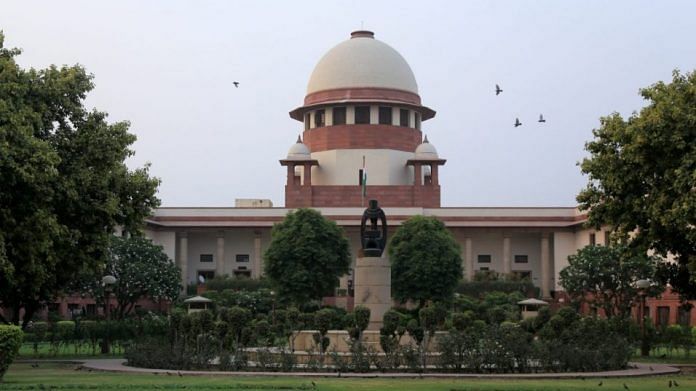It is often said that every crisis brings an opportunity to learn something for the future. For the Indian judiciary, and especially the Supreme Court, the ongoing coronavirus pandemic is one such opportunity to reassess how it plans to go about its functioning once this emergency health crisis goes away. Here’s a suggestive list.
Make all courts video-conference compliant
The current nationwide lockdown has put most things on hold, but justice delivery cannot be one of those. And so, some of the judges of the Supreme Court are now hearing cases through video conferencing from the confines of their homes – and realising its benefits in the process. Yes, there will be some snag and initial hiccups but it would be nothing that our excellent IT companies can’t fix.
India’s high courts and district courts can also start hearing small cases through video-conferencing. They will realise that not only is this method time-efficient (once judges get the hang of the process), it could also lead to saving precious resources.
In order to ensure unjust questions are not raised at a later stage about the impartiality of judges and whether the case was decided as per settled law, judges will need to be more conversant with their understanding of the law. They will also have to keep a check on their tendency to use discretionary powers as much as possible. Discretion, even in the best of circumstances, always leaves room for questions, often bonafide ones.
And, in order to lead by example, the Supreme Court should start hearing and deciding more cases through video conferencing, sending out a clear message to the subordinate courts that this is an idea whose time has come.
Also read: Supreme Court rightly distanced itself from ‘social-distancing’. It’s the executive’s call
Stop being court of first resort for all cases
The Supreme Court ideally should not get involved in any case at the first instance – unless the matter involves a grave constitutional crisis. It should draw a ‘Lakshman rekha’ for itself on what kind of cases it will allow to be listed before it.
According to the available data, there were 60,469 cases pending in the Supreme Court as on 1 March 2020, up from 57,785 cases pending before it in 2019 and 55,529 cases on 1 March 2018. Despite increase in the number of judges and quicker disposal of cases, the pendency in the country’s top constitutional court has been rising steadily.
Another thing that must worry our judges in the Supreme Court is the high number of five or more judge constitutional bench matters that are pending before it — 551 as on 1 March 2020. Of these, 402 cases are five-judge bench matters, 13 are seven-judge bench matters while 136 are nine-judge bench matters.
All these cases involve serious questions of law and Constitution and would require several days of hearing for them to be decided. The question that the Supreme Court should be asking itself is: does it have the time to hear and decide at the earliest these important matters, and if not, what is its solution?
Ideally, the Supreme Court must devote as much time as possible to hear and decide these cases – something that the Supreme Court of the US does. But by deciding to entertain each and every matter that comes before it, India’s Supreme Court leaves very little time for itself to hear important constitutional matters at length.
The ongoing lockdown could provide an answer to the Supreme Court on what requires its time and what doesn’t. For one, it has to cut down on its tendency to turn itself into a court of original jurisdiction for each litigant who approaches it under Article 131 of the Constitution.
The Supreme Court must take a call that it will be the court of original jurisdiction only in cases where the dispute is between the Centre and state(s), two or more states, and important cases involving the breach of fundamental rights of citizens.
Even on the appellate side, the Supreme Court will have to start being more choosey. Every case that the high courts decide shouldn’t be open to adjudication by the Supreme Court. In these cases too, the thumb rule for the Supreme Court must be to follow a twin-pronged strategy: does the case involve important question of law and/or does it involve large-scale violation of citizens’ fundamental rights?
Also read: Corona is a wake up call for Indian courts. They aren’t equipped to function in a crisis
Follow the settled law
The Supreme Court, to lessen its own and subordinate courts’ workload, must make it mandatory for judges to strictly follow the settled law. Judges should know there would be consequences if they ignore the settled law. In bail matters, for example, the settled principle is that grant of bail must be the rule while jail should be the exception.
But, this rule is mostly followed in the breach, including by the Supreme Court, especially in politically sensitive cases.
Even in these trying times, the courts have been unable to reconcile with the settled law, and life and liberty of citizens continue to carry less premium for our superior courts.
This is an opportune time for the Supreme Court to put an end to this.
The author is a senior journalist. Views are personal.




Cases related to pension is also urgent matter ,so these cases should be also heard as urgent cases because it is for livelyhood .
Please contact to me in this regards.
But before do Internet services unruptly
Sitting at home all of us cleaning up the house.
It is a fantastic suggestion.